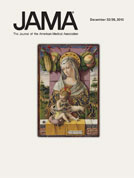 With the third retraction of a paper by Anil Potti this weekend, plus details of various investigations dribbling out, we decided to check in with the world’s two leading medical journals about whether they planned to retract the papers of Potti’s they’d published.
With the third retraction of a paper by Anil Potti this weekend, plus details of various investigations dribbling out, we decided to check in with the world’s two leading medical journals about whether they planned to retract the papers of Potti’s they’d published.
JAMA published two papers by Potti and colleagues: One, “Gene Expression Signatures, Clinicopathological Features, and Individualized Therapy in Breast Cancer,” appeared in 2008. It has been cited 51 times, according to Thomson Scientific’s Web of Knowledge, and was the subject of two letters. In one, a correspondent expressed concerns about the lack of information in the study about Continue reading No Potti retractions on the horizon from JAMA, NEJM






